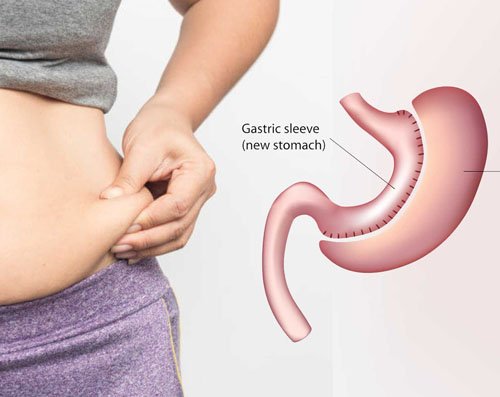
The intervention of Sleeve gastrectomy in Delhi or “vertical gastroplasty calibrated with gastric resection” involves removing a large part of the stomach to form a tube.
Foods will first be slowed down while in the tube and then evacuated very quickly in the small intestine.
The Sleeve acts by several mechanisms that combine:
- A restriction (such as gastroplasty): the volume and size of the stomach are decreased, the passage of food is very slow, but there is no change in the digestion of food.
- A decrease in the rate of ghrêline, which is the hormone of hunger, which leads to a lack of interest in food
- A modification of the bacterial flora of the esophagus, which leads to a happy change in taste for food: patients are much less attracted to meat and starchy foods, and more to fish and green vegetables.
Advantages & Disadvantages
- Sleeve is the most frequently performed bariatric surgery.
- The Sleeve is a complex procedure , with an average hospital stay of 2 to 3 days.
- Sleeve is an intervention performed for over 15 years, its long-term results (10 years) are beginning to be known.
- Weight loss is usually around 4 kg per month, during the first 6 months, then 2 to 4 kg per month.
- Weight loss at 10 years is approximately 65% to 70% of excess weight, which is an intermediate outcome between gastroplasty and bypass.
- Undernutrition and vitamin deficiencies are rare.
In our team, we prescribe vitamins and nutritional supplements for 3 months and a biological assessment at 3 months, 6 months and 1 year.
This biological assessment is usually normal, It sometimes shows small vitamin deficits that are easily compensated by oral route. - The Sleeve is not reversible. However, the tube will expand gradually and will no longer be effective after 5 to 7 years.
- Dietary habits should be changed
3 meals and possibly 2 snacks. - Vomiting is quite rare.
- Regular monitoring by a multidisciplinary team is mandatory.
Hospitalization
THE DAY BEFORE
- You are hospitalized around 17 hours if your intervention is planned in the morning.
- You can eat normally.
- You will be fasting from midnight.
D-DAY
- You have been fasting since midnight. If your intervention is scheduled in the afternoon, you can return in the morning, a light breakfast is possible before 8 am.
- The procedure requires a complete general anesthesia, it is performed by laparoscopy, it lasts 1 to 2 hours.
- After the procedure, you will spend a few hours in the recovery room, then we will take you back to your room.
- You will not have a probe in your nose. A small tube (called Redon) is put in place at the end of the procedure, it comes out through a small hole in the abdomen. Redon is used to aspirate secretions and will be removed on D2.
- Pain medications will be administered by the vein.
- The evening of the intervention: fasting.
THE DAY AFTER THE INTERVENTION (J1)
- You will be able to drink a little water after agreement of the surgeon.
- Pain medications will be administered by the vein.
- A physiotherapist will help you to sit down and make a passive mobilization.
Discharge
You can leave the facility late in the morning, usually D1 or D2 after the procedure.
Your surgeon will give you:
- An order of the different medications needed after the procedure.
- A prescription for scar care and anticoagulant injections.
- A work stoppage of 2 or 3 weeks, depending on your general condition and the arduousness of your professional activity.
- A detailed program for the gradual recovery of your diet.
Precautions
The first month
The first month will allow you to get used to your new stomach. Eat very slowly, because you should not force the small stomach, which is healing.
After the first month
EAT IN CALM AT REGULAR HOURS
- Split your food intake into three meals (and possibly one or two snacks).
- Vary your diet.
- Eat only small pieces.
- Chew for a long time, swallow several times.
- Take the time to enjoy your meal. Remember that digestion begins in your mouth.
- Drink as little as possible during your meals
- When you feel full, stop eating.
- Watch your teeth
One more teaspoon may make you vomit. You have only a mini stomach, do not forget it.
IF YOU VOMIT, WHICH IS A RARE EVENT WITH THE SLEEVE:
- Either you have eaten too much
- Either you have eaten too fast
- Either you have eaten too much chunks
- Either you have not chew enough
- Either you swallowed too fast
BETWEEN MEALS
Drink outside meals often, in small amounts, even without thirst.Regard regular physical activity , recreation and endurance.
The simplest regular physical activity is walking: walk at a good pace but at your own pace, ideally 3 times 30 to 40 minutes a week.
A physiotherapist can help you. After the first month, you can resume the sport without any problem.Respect sufficient hours of sleep.
Do you eventually accompany the level of ” stress management ”
FOLLOW YOUR DOCTOR REGULARLY
In addition to your daily intake of vitamins and trace elements, your doctor will encourage you to optimize your diet in the sense of a better intake of iron and calcium (possibly after a dosage of these elements) .Also attention to a possible protein malnutrition. If you do not bring enough protein to your diet, you will lose weight on your muscle mass, while it would be better to lose weight on your fat or water of your body. At worst, you can suffer protein malnutrition, with decreased immune defenses and fatigue, anemia, increased susceptibility to infections. Good luck !
